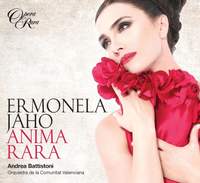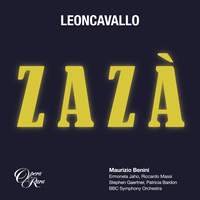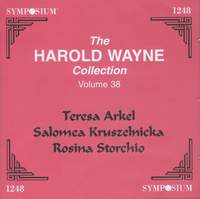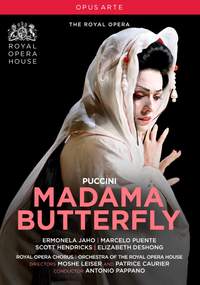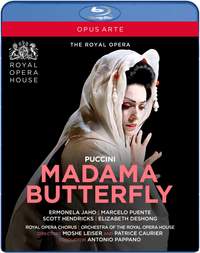Interview,
Ermonela Jaho on Anima Rara
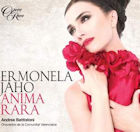 Puccini’s Madama Butterfly has played a central role in the career of Albanian soprano Ermonela Jaho, and for her debut solo recording on Opera Rara she’s chosen to explore the legacy of the original Cio-Cio San, Rosina Storchio (1872-1945) - who also created the title-roles in Leoncavallo’s Zazà and Mascagni’s Lodoletta.
Puccini’s Madama Butterfly has played a central role in the career of Albanian soprano Ermonela Jaho, and for her debut solo recording on Opera Rara she’s chosen to explore the legacy of the original Cio-Cio San, Rosina Storchio (1872-1945) - who also created the title-roles in Leoncavallo’s Zazà and Mascagni’s Lodoletta.
Ahead of the online album launch on Thursday 24th September (more details of this to follow), I spoke to Ermonela about Storchio’s short but remarkable career, how conceptions of verismo style have altered over the last hundred years, and how she built up a picture of the Italian soprano’s on-stage and off-stage personality through exploring her recordings and correspondence with the composers she inspired.
Did your interest in Rosina Storchio begin with Zazà, or were you aware of her already by then?
It all started with Zazà for me: that really was an epiphany, and I’m so grateful to Opera Rara for providing it! Since then I’ve been constantly looking out for different operas and trying to build up a more complete picture of the repertoire in this period; when I was a conservatoire student, most of Mascagni's and Leoncavallo’s operas were really just names to me, and when I started working on Zazà I felt almost ashamed that I didn’t know more. I knew some of the melodies already, but when you have the full scores there in front of you it’s a revelation: you just want to dig and dig!
How much of a picture can we build up of what her voice was like from the music that was written for her?
I think over time we’ve created a stereotype that verismo has to be dramatic and demands big, beautiful voices - but the bottom line is that whilst the stories are dramatic, the heroines are often really young women. Mimì and Musetta in both versions of La bohème, Mascagni's Lodoletta, and Stefana in Giordano’s Siberia are girls, so they call for real agility and lyricism in the voice; you still have to be able to cut through the orchestra, but if you look at the full scores there are so many details and so much delicacy, and perhaps today we don’t respect that. Take Stefana, who’s a real dreamer: we all dream, and we don’t dream screaming! It’s your inner voice which has to be loud in this music. And that’s why when musicologist Ditlev Rindom and the team at Opera Rara encouraged me to start reading about Rosina Storchio, it was such a wonderful surprise to see how all the great verismo composers – Giordano, Leoncavallo, Mascagni, Puccini – wanted this type of singer to premiere their operas. Storchio certainly wasn’t the only soprano (or even the most famous soprano!) of that period, but she had a very particular pathos and fragility, and the more you can put that across on stage the more dramatic the impact on the audience will be.
What sort of a sense do we get of her personality from her correspondence with composers? Was she a particularly forceful character?
No, she genuinely comes across as a gentle, beautiful soul who happened to have this unique aura and magnetism on stage. She didn’t have a long career - in fact she eventually damaged her voice, perhaps because she sang at a level of emotional engagement which I think was quite rare for that period. I read a letter that Puccini wrote to her after the fiasco at the premiere of Madama Butterfly (which really wasn’t a big success at first) where he says to her: ‘So my Butterfly, my passionate little one, it seems to me that in going you take away the best, the most poetic part of my work…To express myself better, I think that Butterfly without Rosina Storchio becomes a thing without a soul’. And the same is true of the other works on the album: Mascagni’s Lodoletta without that pathos is nothing, it’s boring! These composers weren’t just interested in someone who can produce a beautiful sound or spin immaculate high notes for fifteen minutes – they wanted people to feel the characters’ joy, to laugh with them and to cry with them. And from the letters I read I figured she really had that. Going through all of the correspondence made me realise that the soul was the key to it all - hence the title, Anima Rara. Without Storchio’s own ‘rare soul’, maybe these operas would never have existed at all.
How was Storchio’s voice categorised at the time? Was she generally regarded as a full lyric, or a spinto?
She was actually considered a lyrical leggiero – so far removed from the kind of voice we associate with Butterfly today! I was overjoyed to discover this, because it meant that my gut instinct was right: I’m also a lyrical voice, and learning about Storchio and finding myself so comfortable in her repertoire meant that singing verismo wasn’t just a pipe-dream for me. I’ve never aspired to be Santuzza or Minnie in La fanciulla del West, (which is still Puccini, of course, but requires a completely different voice-type, presence and personality), but I did want to explore the right kind of verismo roles, and Storchio and Opera Rara gave me the confidence to do that. I’m so harsh on myself, because of course you feel judged when you’re on stage in front of thousands of people, and of course you can’t expect that everyone will love you. I’m open to others’ opinions, but if I’d paid attention to every single critic I’d stay home and never sing again in my life. I think ‘Did you talk to Puccini? Did you talk to Verdi? About what they wanted in a singer?’! And this is why Opera Rara is so perfect, because it invites us to go back and see how things have changed over time, how the original conception of an opera was often so different from our perception of the piece today.
Have you managed to hear any of Storchio’s own recordings, few and far-between as they are?
I have, thanks as ever to Opera Rara! I’ve heard her Mimì and Musetta, and of course the audio-quality isn’t great, but you still hear exactly how she expresses herself: even if we don’t know much about the music or the plot, she makes it clear that something is funny, and in places in the Leoncavallo Bohème (which is generally more light-hearted than Puccini’s version) she almost sounds like she’s a soubrette in an operetta. But she could do pathos too: as with Callas (who of course recorded a lot more and became far more famous), you truly feel the pain in her particular way, because of how she uses the text and highlights things with a particular inflection. It’s also obvious that she had a really great technique – she was a champion of the pure lyric repertoire, and a lot of these arias are quite heavily orchestrated in places. (All the great verismo composers loved Wagner, and that often comes across strongly in their orchestration, even if the vocal writing is very different). It’s incredible to hear how she could move between roles like Violetta, Linda di Chamounix and Manon and being the muse of the great verismo composers.
In terms of the less familiar repertoire on the album, the aria from Giordano’s Siberia was a real revelation to me…
Yes! I don’t yet know the whole opera, and I’m still trying to track down a complete recording…maybe I’ll propose it to Opera Rara! But this particular aria is like a meditation: I felt so free and at peace every time I sang through it, because the music is so comfortable emotionally and vocally. Throughout all this time staying at home, studying new repertoire and dreaming of the time when opera-houses will reopen, I’ve used that aria just to calm down and ground myself. We recorded it in only two takes: it just clicked immediately.
Other than the Giordano, what were the new discoveries for you?
There were three others, the first being Mascagni’s Iris. It took me a while to settle into the musical language, because the harmony and chromaticism which he uses to depict her nightmare is quite strange on first hearing. I was supposed to make my debut in the role in Madrid in May, which unfortunately fell victim to COVID cancellations, but I got as far as preparing the whole opera, and it’s a masterpiece! Lodoletta was also new, and Massenet’s Sapho: I sang and recorded Irène (a secondary role, a little like Micaëla in Carmen) when Wexford Festival staged Sapho in 2001, and there was something that I loved about the piece although my role didn’t give me much opportunity to dig very deeply. But as I explored it more for this recording I came to see it as something incredible. It’s not unlike Traviata in places, but it’s a challenge because of the tessitura: Sapho needs a soprano with a strong middle register and good low notes, plus a lot of fire and support.
We’re hoping for a full production of Sapho, and I’d also love to repeat Zazà now that I understand her more, but it needs a really great stage-director to make it work. I’m so looking forward to these new roles: it’s easy to market operas that are well established, but it requires real artistic vision to encourage an audience to take a new look at this period. This is Opera Rara’s vision, and it’s one which I passionately share with them: every time I work with Opera Rara to discover new repertoire I feel a better human being! Of course music and theatre is a business, but so often we don’t take the time to dig - it’s a pity to let things gather dust in libraries, and Opera Rara is a real gift to humanity.
Had you worked with Andrea Battistoni before?
This was our first project together, and he was fantastic. He’s very young, and before we met I was slightly trepidant, because sometimes you need an old soul in this repertoire - but then again, you can be ten years old and have an old soul! Andrea adores verismo, and we just 'got' each other instantly. He’d just come from conducting Iris in Japan and he gave me so much detail about the whole opera, not just the aria; it opened my mind and horizons. When we went in to record, the orchestra saw immediately that they had a leader, not a young conductor finding his feet: he knew exactly what he wanted, and how to bring it to fruition in such a short time. It’s all thanks to Andrea that we were able to put this recording together so quickly – it’s like he has fifty or sixty years of conducting under his belt already! Strangely enough it was Butterfly and Traviata, which I’ve sung so many times, which we rehearsed and re-recorded the most: all of us were so familiar with this repertoire, but the more we explored it together the more nuances we found, and by the end of the process it truly felt as new and fresh as the unfamiliar arias on the album. I’d expected to be exhausted after working like that for six hours, but I came out feeling so energised – the time simply flew by!
Anima Rara is released on Opera Rara on Friday 25th September; Katherine will host the online album-launch in association with the label and Warner Classics the previous evening, including a live Q&A with Ermonela Jaho and Andrea Battistoni.
Available Formats: CD, MP3, FLAC, Hi-Res FLAC
Ermonela Jaho (Zazà), Stephen Gaertner (Cascart), Riccardo Massi (Milio), Patricia Bardon (Anaide), David Stout (Bussy)
BBC Symphony Orchestra, Maurizio Benini
Available Formats: MP3, FLAC, Hi-Res FLAC
Rosina Storchio can be heard here in arias from Auber's Fra Diavolo, Donizetti's Linda di Chamounix, Bellini's La Sonnambula, and Leoncavallo's La Bohème.
Available Formats: MP3, FLAC
Ermonela Jaho (Cio-Cio San), Marcelo Puente (Pinkerton), Scott Hendricks (Sharpless), Carlo Bosi (Goro), Elizabeth DeShong (Suzuki), Jeremy White (Bonze), Emily Edmonds (Kate Pinkerton), Gyula Nagy (Imperial Commissioner), Yuriy Yurchuk (Prince Yamadori)
Orchestra of The Royal Opera House, Royal Opera Chorus Antonio Pappano & Moshe Leiser/Patrice Caurier
Available Format: DVD Video
Ermonela Jaho (Cio-Cio San), Marcelo Puente (Pinkerton), Scott Hendricks (Sharpless), Carlo Bosi (Goro), Elizabeth DeShong (Suzuki), Jeremy White (Bonze), Emily Edmonds (Kate Pinkerton), Gyula Nagy (Imperial Commissioner), Yuriy Yurchuk (Prince Yamadori)
Orchestra of The Royal Opera House, Royal Opera Chorus Antonio Pappano & Moshe Leiser/Patrice Caurier
Available Format: Blu-ray


